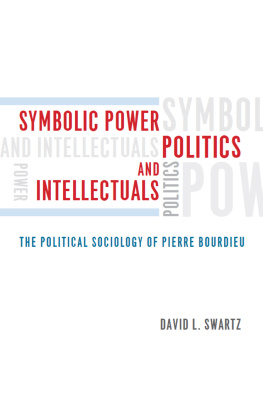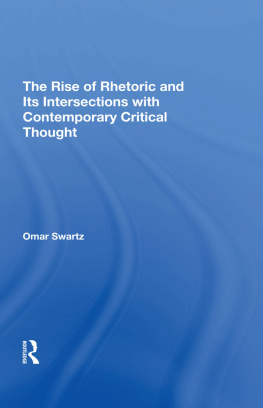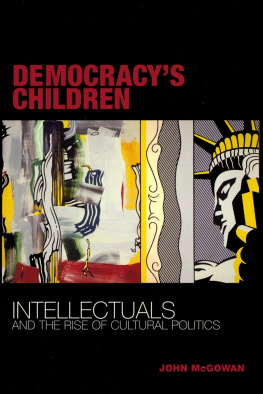David L. Swartz is assistant professor of sociology at Boston University. He is the author of Culture & Power: The Sociology of Pierre Bourdieu and coeditor with Vera L. Zolberg of After Bourdieu: Influence, Critique, Elaboration.
The University of Chicago Press, Chicago 60637
The University of Chicago Press, Ltd., London
2013 by The University of Chicago
All rights reserved. Published 2013.
Printed in the United States of America
22 21 20 19 18 17 16 15 14 13 1 2 3 4 5
ISBN-13: 978-0-226-92500-4 (cloth)
ISBN-13: 978-0-226-92501-1 (paper)
ISBN-13: 978-0-226-92502-8 (e-book)
ISBN-10: 0-226-92500-5 (cloth)
ISBN-10: 0-226-92501-3 (paper)
ISBN-10: 0-226-92502-1 (e-book)
Library of Congress Cataloging-in-Publication Data
Swartz, David, 1945
Symbolic power, politics, and intellectuals : the political sociology of Pierre Bourdieu / David L. Swartz.
pages. cm.
Includes bibliographical references and index.
ISBN 978-0-226-92500-4 (cloth : alk. paper) ISBN 0-226-92500-5 (cloth : alk. paper) ISBN 978-0-226-92501-1 (pbk. : alk. paper) ISBN 0-226-92501-3 (pbk. : alk. paper) ISBN 978-0-226-92502-8 (e-book) ISBN 0-226-92502-1 (e-book) 1. Sociology. 2. Political sociology. 3. State, The. 4. Power (Social sciences). 5. Bourdieu, Pierre, 19302002 Political and social views. I. Title.
HM585.S93 2013
301dc23
2012023407

This paper meets the requirements of ANSI/NISO Z39.48-1992 (Permanence of Paper).
Preface and Acknowledgments
The multifaceted work of Pierre Bourdieu, clearly one of the greatest postWorld War II sociologists, has inspired much research in a wide variety of areas, such as culture, taste, education, theory, and stratification. Largely neglected, however, are the underlying political analysis in Bourdieus sociology, his political project for sociology, and his own political activism. Yet the analysis of power, particularly in its cultural forms, stands at the heart of Bourdieus sociology. Bourdieu challenges the commonly held view that symbolic power is simply symbolic. His sociology sensitizes us to the subtle and influential ways that cultural resources and symbolic categories and classifications interweave prevailing power arrangements into everyday life practices. Indeed, cultural resources and processes help constitute and maintain social hierarchies. And these form the bedrock of political life.
Moreover, Bourdieu offers not only a sociology of politics but also a politics of sociology. He assigns to sociology as science a critical debunking role of existing relations of domination. Sociology is not only science; it is also a form of political engagement, or, in his words, scholarship with commitment for a more just and democratic life.
This interconnected vision for sociology as science and sociology as political engagement is not well understood, nor is the way this vision found formulation, elaboration, and modification in Bourdieus own life, work, and political engagements. I wrote this book to explain this vision and evaluate its potential for contributing to a better understanding and a more democratic ordering of political life.
That power stands at the core of Bourdieus sociology became clear to me as a student in Paris in the early 1970s, when I first became acquainted with Bourdieus work, followed his seminar, and met a number of colleagues and students affiliated with his Center for European Sociology. The theme of power guided the way I presented his work in Culture and Power (University of Chicago Press, 1997).
...
Power also stands at the heart of political sociology. It was in preparing a paper for the 2001 Nordic Governance Summit at the Center for Research in Public Organization and Management, Department of Political Science, University of Copenhagen, that I started to compare Bourdieus thinking on power, politics, and the state to other political perspectives. Then I began to realize that Bourdieu could be read as a political sociologist. That conference presentation led to the publication of Pierre Bourdieus Political Sociology and Governance Perspectives in Governance as Social and Political Communication, edited by Henrik P. Bang (Manchester: Manchester University Press, 2003). I wish to thank Henrik Bang for his invitation to participate in that conference, which in hindsight proved to be a starting point for this book.
The theme of Bourdieus sociology of politics and his politics of sociology took shape in my thinking over several years through numerous conversations and presentations at a variety of professional gatherings. In May 2003 I gave a lecture titled The Politics of Symbolic Power: On Pierre Bourdieus Politics, His Analysis of Power, and His Own Political Activism at the City University of New York Graduate Center. In November 2003 I helped convene the Paris group (Erik Neveu, Daniel Gaxie, Michel Offrel, and Niilo Kauppi) for the Bourdieu Workshop, on Bourdieu as a political sociologist. That group planted the seeds for what would eventually become the Political Sociology Standing Group (http://www3.unil.ch/wpmu/ecpr-polsoc/) within the European Consortium for Political Research (ECPR). My presentation at the September 2005 Budapest meeting of the ECPR led to the publication of Pierre Bourdieu and North American Sociology: Why He Doesnt Fit In but Should (French Politics 4 [2006]: 8499). I want to thank Elizabeth Silva and Alain Warde for their invitation to present a paper at the Cultural Analysis: The Legacy of Bourdieu symposium at the Open University, Milton Keynes, UK, July 1112, 2007. This presentation led to the publication of Pierre Bourdieus Political Sociology and Public Sociology in Cultural Analysis and Bourdieus Legacy: Settling Accounts and Developing Alternatives, edited by Elizabeth Silva and Alain Warde (London: Routledge, 2010). My thanks to Jess Souza for the invitation to present How to Research with Bourdieus Master Concepts at the International Seminar of Contemporary Theory called Social Conflict at the Heart and Periphery of Capitalism: Bourdieu as a Starting Point (University of Juiz de Fora, Brazil, September 35, 2008). A special thanks to Uwe Bittlingmayer for inviting me to give the lecture Bourdieu and the Sociology of Politics at the Was tun mit dem Erbe? conference at the University of Bielefeld, Germany, October 23, 2009. My thanks also to Rebecca Adler-Nissen for the invitation to participate in the Bourdieu in International Relations workshop at the Center for Advanced Security Theory, Department of Political Science, University of Copenhagen (December 2010). Finally, special thanks to Stefan Bernhard and Christian Schmidt-Wellenburg for their invitation to present at the Research Program of Field Analysis Conference, University of Potsdam, Germany, May 26, 2011, which led to the publication of Zu einer Bourdieuschen Analyse der Politik in Feldanalyse als Forschungsprogramm 1: Der programmatische Kern, edited by Stefan Bernhard and Christian Schmidt-Wellenburg (Wiesbaden: VS, 2012). Portions of these presentations and publications figure into some of the chapters in this book, though elaborated significantly.
On the topic of Bourdieu and politics, I have benefited from fruitful conversations and e-mail exchanges with many individuals and want to thank in particular the following: Afrnio Garcia, Virginie Guiraudon, Julian Go, David Karen, Grard Mauger, Frank Poupeau, Gisle Sapiro, Rhys Williams, and Vera Zolberg. Particular thanks go to Niilo Kauppi for numerous conversations and e-mail exchanges about Bourdieu over the last several years.
 This paper meets the requirements of ANSI/NISO Z39.48-1992 (Permanence of Paper).
This paper meets the requirements of ANSI/NISO Z39.48-1992 (Permanence of Paper).











